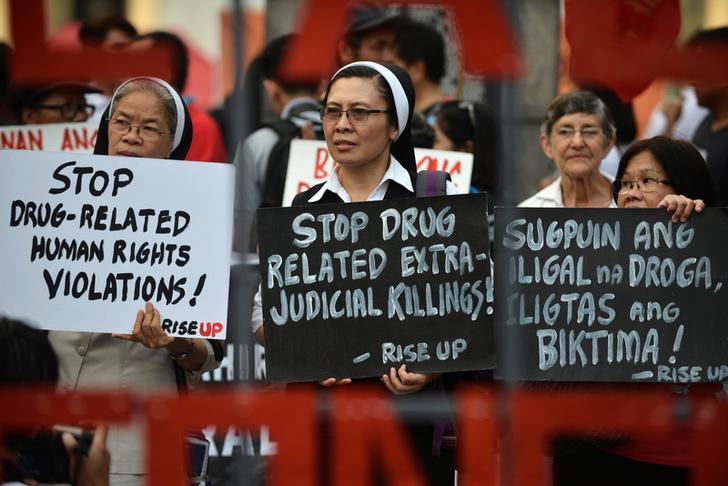
| Published March 24, 2025
Introduction
The International Criminal Court’s investigation into former President Rodrigo Duterte’s administration has placed the Philippines at a crucial juncture in its history. The inquiry, primarily focused on human rights violations linked to Duterte’s controversial war on drugs, raises fundamental questions about sovereignty, accountability, and the preservation of human rights in a democratic society.
The War on Drugs: A Double-Edged Sword
Duterte’s administration, spanning from 2016 to 2022, was marked by a brutal campaign against illegal drugs that led to thousands of deaths. The government claimed these operations were necessary to address a national crisis, portraying drug dealers and users as threats to society. However, human rights organizations reported widespread extrajudicial killings and systemic abuses, prompting outrage both domestically and internationally.

Rodrigo Duterte holds a rifle at Camp Crame, the national police headquarters in Quezon city north-east of Manila, April 2018. Photograph: Bullit Marquez/AP
The ICC seeks to investigate these allegations, as it is bound by its mandate to prosecute crimes against humanity and uphold international human rights standards. This move, while applauded by human rights advocates, has been met with fierce resistance from Duterte’s supporters who argue that the ICC’s interference undermines Philippine sovereignty.
Sovereignty vs. Global Accountability
At the heart of this controversy lies a critical issue: the balance between national sovereignty and global accountability. Duterte’s administration withdrew the Philippines from the ICC in 2019, asserting that the court was biased against him and his government. This withdrawal raised concerns about the implications for justice in the Philippines, particularly for the victims of the drug war.
Critics argue that stepping away from international oversight could embolden future administrations to violate human rights without fear of repercussions. Proponents of Duterte, however, contend that the ICC’s actions amount to neocolonial intervention and a disregard for the Philippines’ autonomy in addressing its own security issues.
The Human Rights Landscape
The ICC’s investigation has rekindled discussions about human rights in the Philippines. Various sectors, including civil society groups, legal experts, and the clergy, have rallied to highlight the need for accountability. They argue that respect for human rights is foundational for democracy and that any nation must grapple with its past to forge a just future.
Catholic nuns hold placards as they protest against drug-related extrajudicial killings, on International Human Rights Day in Manila, Philippines, December 10, 2016. © 2016 Ezra Acayan/Reuters
This dialogue has been facilitated by a growing awareness among the Filipino populace of the importance of adhering to international human rights standards. The debate surrounding Duterte’s actions and their consequences urges the country to confront uncomfortable truths about governance, violence, and human dignity.
Political Ramifications
As the ICC moves forward, the case poses significant political implications for the current administration under President Ferdinand “Bongbong” Marcos Jr. How the government chooses to respond to the ICC’s inquiries and human rights concerns will be critical in shaping its legitimacy and relationship with the international community.
Marcos Jr.’s approach will likely reflect a balancing act: retaining the trust of Duterte’s loyalists while also addressing the concerns of a populace increasingly aware of human rights issues. His stance could either reinforce or challenge the authoritarian tendencies seen in Duterte’s era.
Conclusion
The ICC’s ongoing investigation into Duterte’s war on drugs transcends mere legal proceedings; it is a litmus test for the Philippines’ commitment to human rights and its place in the global community. As the nation grapples with its recent past, it stands at a crossroads, with vital decisions ahead that will determine its trajectory as a democracy grounded in justice, accountability, and respect for human dignity.



Be the first to comment